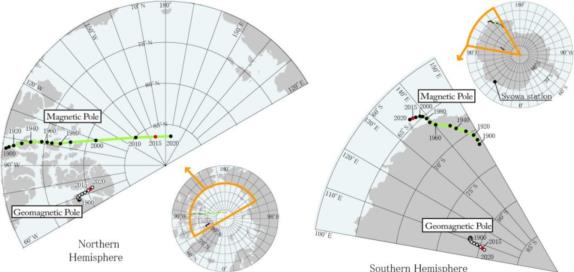
NavList:
A Community Devoted to the Preservation and Practice of Celestial Navigation and Other Methods of Traditional Wayfinding
From: Bruce J. Pennino
Date: 2019 Jan 14, 09:18 -0500
Some of the claims in the media coverage on this story are a little muddled. For example, take the headline: "moving more and more quickly" (in other words, accelerating). But is it? Have a look at this plot of the two magnetic poles. The "magnetic pole", which the articles are describing, has certainly been moving quickly in recent decades. If you look at the plot at twenty-year intervals, the motion from 2000-2020 (projected) is greater than from 1980-2000 which was itself greater than the motion from 1960-1980. But if you look at five-year intervals during the past twenty years, we can see that there is no significant acceleration, and actually there appears to be some deceleration near the end.
Part of the issue with the magnetic models requiring more frequent updating is apparently due to real changes in the magnetic field, however some of it is simply a coordinate singularity effect as the magnetic pole passes near the geographic pole. The change in longitude is accelerating sharply even though the actual speed of the pole point has decelerated somewhat.
Notice also that the south magnetic pole is moving much more slowly. It has been drifting away from the south geographic pole in the period when the north magnetic pole was shooting toward higher northern latitude. These "magnetic poles" are sensitive to very small changes in the actual magnetic field. They reprsent the locations where the field is exactly vertical. A magnetic needle free to point in any direction in three dimensions would point straight down at the north magnetic pole.
Also notice that the geomagnetic poles (necessarily symmetrical) have been shifting much more slowly. The geomagnetic poles show the location of the poles of the basic dipole representation of the earth's magnetic pole. That is, if you replace the earth's "lumpy" magnetic field by a simple bar magnet most nearly matching the true field, where would its ends be aligned? As you can see in the plot, this "average" pole is moving slowly towards higher geographic latitude. The dipole axis has become more nearly aligned with the rotational axis by about 2.5° in the past century. It's a much slower shift than the motion of the "actual" magnetic poles. There's really no way to guess whether this will continue in the next century.
Magnetic field changes and pole motions have come up before in NavList discussions. For nostalgia, here's an animation I made available over a decade ago showing changes in the magnetic variation (which everyone else, outside of navigation, calls "magnetic declination") over the course of 500 years. Note that these are not magnetic field lines. They are lines of constant magnetic variation, which change more dramatically than the field lines themselves.
Frank Reed







